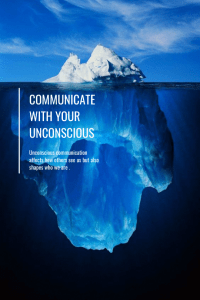By Communication Consultant Xinyi Cui (Accounting and BIS, ’22)
 We often ignore our unconscious mind. Because it is not part of our focal awareness, we may not recognize how influential our unconscious is in our daily life. In fact, much of what we communicate is unconscious–we use gesture, body language, or tone mostly automatically without thinking consciously to do so. While it’s easy to understand how our unconscious communication subtly provides information about our mood, our enthusiasm, or our openness, did you know that it also can shape who we are? A TED Talk from a social psychologist Amy Cuddy highlights that our body language may shape our behaviors and identities. In fact, we can practice unconscious communication techniques for self improvement.
We often ignore our unconscious mind. Because it is not part of our focal awareness, we may not recognize how influential our unconscious is in our daily life. In fact, much of what we communicate is unconscious–we use gesture, body language, or tone mostly automatically without thinking consciously to do so. While it’s easy to understand how our unconscious communication subtly provides information about our mood, our enthusiasm, or our openness, did you know that it also can shape who we are? A TED Talk from a social psychologist Amy Cuddy highlights that our body language may shape our behaviors and identities. In fact, we can practice unconscious communication techniques for self improvement.
You may notice that animals try to make themselves look more powerful when they face a potential risk. For example, cats raise the hair on their backs and orangutans spread out and stand tall aiming to make their bodies appear bigger and scare the enemies.
Humans do the same. When we feel powerful or need to be powerful, we push our shoulders back and stand tall. That is, we adopt high-power postures. When we feel powerless, we tend to bring our limbs closer, hunch over, and get small–low power postures.
Cuddy and her team wondered whether we can reverse the cause and effect, so they conducted experiments to test whether people feel more powerful when they pretend to be powerful. Basically, when people walked into the lab, they were asked to do high-power or low-power poses for two minutes. Then the experimenters asked them questions and collected saliva samples which they tested for testosterone, a hormonal indicator of risk tolerance. The results show that people who do high-power poses experienced a 20% increase in testosterone while low-power poses reduced it by 10%. The study suggests that perhaps body language doesn’t only influence others but also influences ourselves.
So how can we utilize this fact to help us improve ourselves and our lives? Cuddy suggested that we should pretend to be powerful before we have an interview, a public presentation, or other situations that make us anxious. More specifically, we should stretch up our bodies for two minutes by raising up our arms and lifting our chins. Doing so will make us feel more powerful mentally, which can help us perform at our best.
Another tip is to verbally repeat a sentence in the format of “I am getting [adjective] and [adjective]”, such as “I am getting better and better” or “I am getting more confident and knowledgeable” several times before sleeping. Such self-talk may filter into our unconscious and enable us to improve our confidence.
Do you have any questions about unconscious communication? Please leave your comment below. And you are also welcome to visit the RCBC, the Lehigh Business communication center, where our staff members always love to provide you with communication suggestions.
Get information and resources about our center at The Philip Rauch Center for Business Communication.
